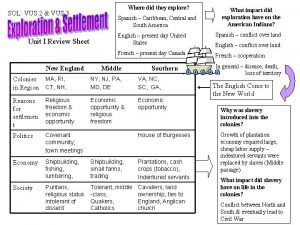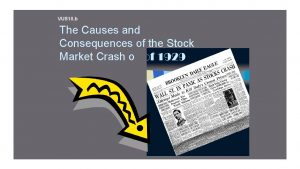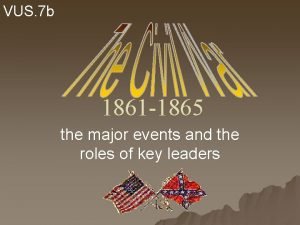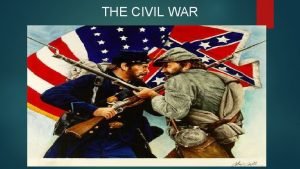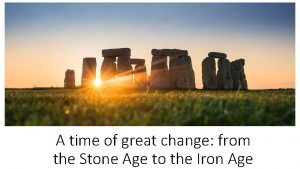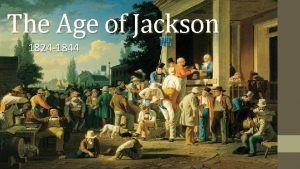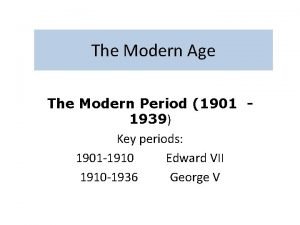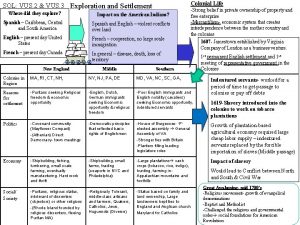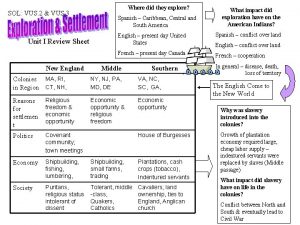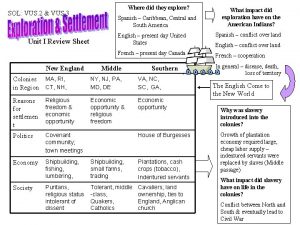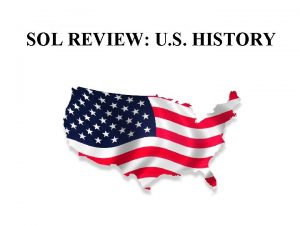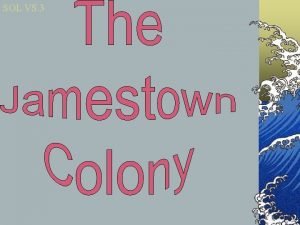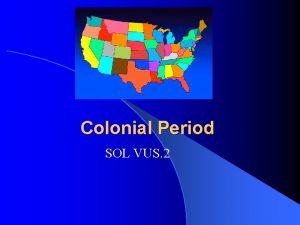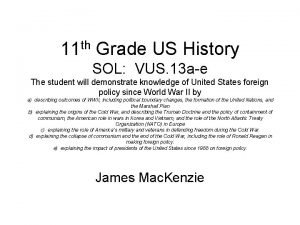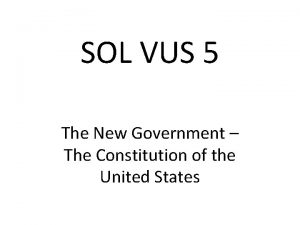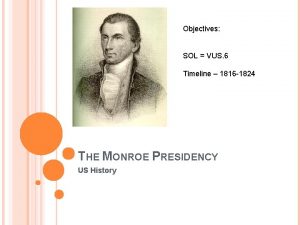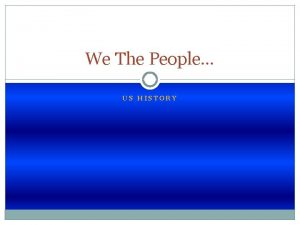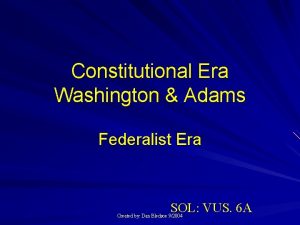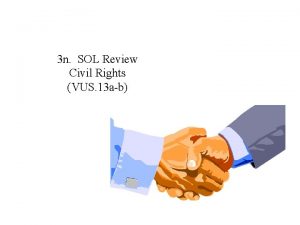Age of Jackson SOL VUS 6 The Age























































- Slides: 55

Age of Jackson SOL VUS. 6

The Age of Jackson ushered in a new democratic spirit in American politics.

The election of Andrew Jackson came at a time when the mass of American people, who had previously been content with rule by the “aristocracy, ” participated in the electoral process.

The distinction between “aristocrat” and common man was disappearing as new states provided for universal manhood suffrage, while the older states were lowering property requirements for voting.

The number of eligible voters increased as previous property qualifications were eliminated. Prior to the election of 1828, the majority of the American people had been satisfied to have “aristocrats” select their President – now they no longer believed the aristocrats were always the most qualified.

By 1828, Americans began to see Americans as equals and were more eager to participate in the electoral process. Delegates from states chose candidates for President at nominating conventions.

Terms to Know n n Aristocracy– government in which power is given to those believed to be best qualified. Aristocrat– A member of an aristocracy.

Age of Jackson's veto of legislation to recharter the bank of U. S made the presidential veto part of legislative process. After this, Congress was forced to consider the presidential veto when proposing legislation.

Once elected, Andrew Jackson employed the “spoils system” to reward loyalty. This system is the practice of using public offices to benefit members of the victorious party. In this system, loyal supporters were rewarded with government jobs.

Jackson and the Bank of the United States Distrusting the bank as an undemocratic tool of the Eastern elite, Jackson vetoed the rechartering of the bank in 1832.

Jackson’s bank veto became the central issue in the election of 1832, as Henry Clay, the National Republican candidate, supported the bank.

Jackson’s reelection brought an end to the bank, as Jackson withdrew government money and deposited it in state banks. These banks were known as his “pet banks”.

His actions caused a major economic depression, resulting in the Panic of 1837.

Panic of 1837 The Panic of 1837 resulted from reckless speculation. This economic situation led to bank failures and dissatisfaction with the use of state banks as depositories for public funds.

Cultural, Economic, and Political Issues of the Early Nineteenth Century

The nation struggled to resolve sectional issues. This produced a series of crises and compromises.

These crises took place over the admission of new states into the Union during the decades before the Civil War. The issue was always whether the number of “free states” and “slave states” would be balanced, thus affecting power in the Congress.

Economic divisions The Northern states developed an industrial economy based on manufacturing. They favored high protective tariffs to protect Northern manufacturers from foreign competition.

The Southern states developed an agricultural economy consisting of a slavery-based system of plantations in the lowlands along the Atlantic and in the Deep South and subsistence farmers in the foothills and valleys of the Appalachian mountains.

The South strongly opposed high tariffs, which made the price of imported manufactured goods much more expensive.

The growing division over slavery and states’ rights were issues that continually caused conflicts.

The abolitionist movement grew in the North, led by William Lloyd Garrison, publisher of The Liberator, an antislavery newspaper, and many New England religious leaders, who saw slavery as a violation of Christian principles.

The solution to the issue of slavery called for by William Lloyd Garrison’s publication “the Liberator” was the immediate and uncompensated emancipation of slaves.

Harriet Beecher Stowe, wife of a New England clergyman, wrote Uncle Tom’s Cabin, a best-selling novel that inflamed Northern abolitionist sentiment. Southerners were frightened by the growing strength of Northern abolitionism.

Slave revolts in Virginia, led by Nat Turner and Gabriel Prosser, fed white Southern fears about slave rebellions and led to harsh laws in the South against fugitive slaves. Southerners who favored abolition were intimidated into silence.

The admission of new states continually led to conflicts over whether the new states would allow slavery (“slave states”) or prohibit slavery (“free states”). Numerous compromises were struck to maintain the balance of power in Congress.

The Missouri Compromise of 1820 drew an east-west line through the Louisiana Purchase, with slavery prohibited above the line and allowed below, except that slavery was allowed in Missouri, north of the line.

The Compromise of 1850 n n In the Compromise of 1850, California entered as a free state The new Southwestern territories acquired from Mexico would decide on their own if slavery would be allowed Slave trade was outlawed in the District of Columbia The Fugitive Slave Law required the forcible return of runaway slaves

The Kansas-Nebraska Act of 1854 repealed the Missouri Compromise line by giving people in Kansas and Nebraska the choice whether to allow slavery in their states (“popular sovereignty”). This law produced bloody fighting in Kansas as a pro- and anti- slavery forces battled each other. It also led to the birth of the Republican Party that same year to oppose the spread of slavery.

The issue of nullification became an argument used by dissatisfied states. Southerners argued that individual states could nullify laws passed by the Congress. They also began to insist that states had entered the Union and could leave (“secede”) freely if they chose.

Abraham Lincoln, who had joined the new Republican Party, and Stephen Douglas, a Northern Democrat, conducted numerous debates when running for the U. S. Senate in Illinois in 1858. Lincoln opposed the spread of slavery into new states while Douglas stood for “popular sovereignty. ”

The Dred Scott decision by the Supreme Court overturned efforts to limit the spread of slavery and outraged Northerners. In this case, a slave, Dred Scott, sued for his freedom on the basis that he had lived on free soil for five years. The Court ruled that since Dred Scott was private property, he could be taken into any territory and be legally held there in slavery. It was also agreed that a slave was not a citizen and could not sue in federal court.

Enforcement of the Fugitive Slave Act, which required slaves who escaped to free states to be forcibly returned to their owners in the South, also outraged Northerners.

Lincoln warned, “A house divided against itself cannot stand. ” The nation could not continue half-free, half-slave. The issue must be resolved.

The women’s suffrage movement At the same time the abolitionist movement grew, another reform movement took root, to give equal rights to women.

Feminists met at Seneca Falls, New York in a Women’s Rights Convention. At the convention, Elizabeth Cady Stanton read the “Declaration of Sentiments” which declared all men and women equal. The Seneca Falls meeting launched the modern women’s rights movement.

Elizabeth Cady Stanton and Susan B. Anthony became involved in women’s suffrage before the Civil War, but also continued with the movement after the war. The National Woman Suffrage Association was led by Stanton and Anthony and fought for women’s equality in courts and workplaces as well as at the polls.

Elizabeth Cady Stanton was a founding mother of American feminism who devoted seven decades of her life to the fight for women’s rights.

Susan B. Anthony was a militant lecturer for women’s rights. She became such a conspicuous advocate of female rights that progressive women everywhere were called “Suzy Bs. ”


1. Who fought against the Bank of the United States? Andrew Jackson After getting rid of the Bank of the United States, where was federal money deposited? In state “pet banks”

2. The forced movement of the Cherokee Indians was known as the “Trail of Tears” the ____________. Where were the Indians relocated to? Oklahoma

3. What was the belief that America would expand across the continent to the Pacific Ocean called? Manifest Destiny

4. Which section of the country favored high tariffs? The North – to protect their manufacturing interests How did the South feel about tariffs? They didn’t like them because they had to purchase items at a higher price.

5. What did William Lloyd Garrison call for in The Liberator? The immediate and uncompensated emancipation of slaves

6. What did the Seneca Falls Declaration call for? Equal rights for men and women

7. What state was entered into the Union in the Compromise of 1850? California Was it a free or slave state? free

8. What was the concept that produced bloody fighting between pro- and anti- slavery forces in Kansas? Popular sovereignty

9. Why couldn’t Dred Scott sue for his freedom? He was a slave not a citizen. Was Dred Scott granted his freedom? No, it was declared that slaves who were transported to free states remained slaves.

10. How did the Missouri Compromise maintain the balance between slave and free states? Maine was admitted as a free state. Missouri was admitted as a slave state.

11. What was the purpose of the Fugitive Slave Act? To prevent slaves from running away to free states Runaway slaves were forcibly returned

12. What is it called when states attempt to repeal a federal law or deem that law unconstitutional? Nullification

13. Who said “A house divided against itself cannot stand”? Abraham Lincoln

14. Who led slave revolts in Virginia? Nat Turner and Gabriel Prosser

15. How was the District of Columbia affected in the Compromise of 1850? Slave trade was outlawed in this district
 Greyhound vus
Greyhound vus Vus review
Vus review Vus.10b when was the stock market crash?
Vus.10b when was the stock market crash? Vus 7a what event sparked secession of the southern states?
Vus 7a what event sparked secession of the southern states? The civil war ended
The civil war ended Contoh koloid liofil
Contoh koloid liofil Iron age bronze age stone age timeline
Iron age bronze age stone age timeline Stone age, bronze age iron age timeline
Stone age, bronze age iron age timeline The age of jackson 1824-1844
The age of jackson 1824-1844 The age of jackson 1824-1844
The age of jackson 1824-1844 Tư thế worms-breton
Tư thế worms-breton Tư thế ngồi viết
Tư thế ngồi viết ưu thế lai là gì
ưu thế lai là gì Chó sói
Chó sói Thẻ vin
Thẻ vin Thơ thất ngôn tứ tuyệt đường luật
Thơ thất ngôn tứ tuyệt đường luật Các châu lục và đại dương trên thế giới
Các châu lục và đại dương trên thế giới Từ ngữ thể hiện lòng nhân hậu
Từ ngữ thể hiện lòng nhân hậu Diễn thế sinh thái là
Diễn thế sinh thái là Slidetodoc
Slidetodoc V cc
V cc Phép trừ bù
Phép trừ bù Chúa sống lại
Chúa sống lại Lời thề hippocrates
Lời thề hippocrates Sự nuôi và dạy con của hươu
Sự nuôi và dạy con của hươu đại từ thay thế
đại từ thay thế Vẽ hình chiếu vuông góc của vật thể sau
Vẽ hình chiếu vuông góc của vật thể sau Quá trình desamine hóa có thể tạo ra
Quá trình desamine hóa có thể tạo ra Công của trọng lực
Công của trọng lực Thế nào là mạng điện lắp đặt kiểu nổi
Thế nào là mạng điện lắp đặt kiểu nổi Các loại đột biến cấu trúc nhiễm sắc thể
Các loại đột biến cấu trúc nhiễm sắc thể Bổ thể
Bổ thể Vẽ hình chiếu đứng bằng cạnh của vật thể
Vẽ hình chiếu đứng bằng cạnh của vật thể Phản ứng thế ankan
Phản ứng thế ankan Kể tên các môn thể thao
Kể tên các môn thể thao Sự nuôi và dạy con của hổ
Sự nuôi và dạy con của hổ điện thế nghỉ
điện thế nghỉ Một số thể thơ truyền thống
Một số thể thơ truyền thống Thế nào là sự mỏi cơ
Thế nào là sự mỏi cơ Trời xanh đây là của chúng ta thể thơ
Trời xanh đây là của chúng ta thể thơ Thiếu nhi thế giới liên hoan
Thiếu nhi thế giới liên hoan Bảng số nguyên tố lớn hơn 1000
Bảng số nguyên tố lớn hơn 1000 Phối cảnh
Phối cảnh Tỉ lệ cơ thể trẻ em
Tỉ lệ cơ thể trẻ em Các châu lục và đại dương trên thế giới
Các châu lục và đại dương trên thế giới Thế nào là hệ số cao nhất
Thế nào là hệ số cao nhất Hệ hô hấp
Hệ hô hấp Tư thế ngồi viết
Tư thế ngồi viết Bàn tay mà dây bẩn
Bàn tay mà dây bẩn Hát kết hợp bộ gõ cơ thể
Hát kết hợp bộ gõ cơ thể đặc điểm cơ thể của người tối cổ
đặc điểm cơ thể của người tối cổ Mật thư tọa độ 5x5
Mật thư tọa độ 5x5 Victorian age and modern age
Victorian age and modern age Introduction to vedic period
Introduction to vedic period Paleolithic vs neolithic
Paleolithic vs neolithic Romantic age and victorian age
Romantic age and victorian age

